Reading

Anonymous: A Man Reading (c. 1660)
"I gratefully retained little but the memory of the pleasure I derived when Reading to survive my exile."
However hostile and unwelcoming DC initially seemed, its libraries warmly embraced me. From the Arlington County library in Ballston, Virginia, and on to Takoma Park's little city library and Montgomery County, Maryland's Silver Spring branch, I found warm refuge within each. I rushed to the Ballston Branch to find a remarkably bright and well-appointed space when we were still in temporary housing. I marveled at the selections and immediately chose two books that would profoundly influence me and my upcoming transition. James Carse's The Religious Case Against Belief and James Hoopes' False Prophets: The Gurus Who Created Modern Management and Why Their Ideas Are Bad for Business Today. Carse's book reminded me that the purpose of inquiry might never be to find an answer but perhaps to more deeply appreciate the questions. Hoopes' book read like I had written it and reassured me that maybe I wasn't as crazy as I sometimes felt. I also found some CDs by Acoustic Academy. These became the soundtrack for my upcoming successful house search. I devoured those books before rushing back for more.
Those libraries and, more importantly, their books became my refuge while I was Exiled.
Carole
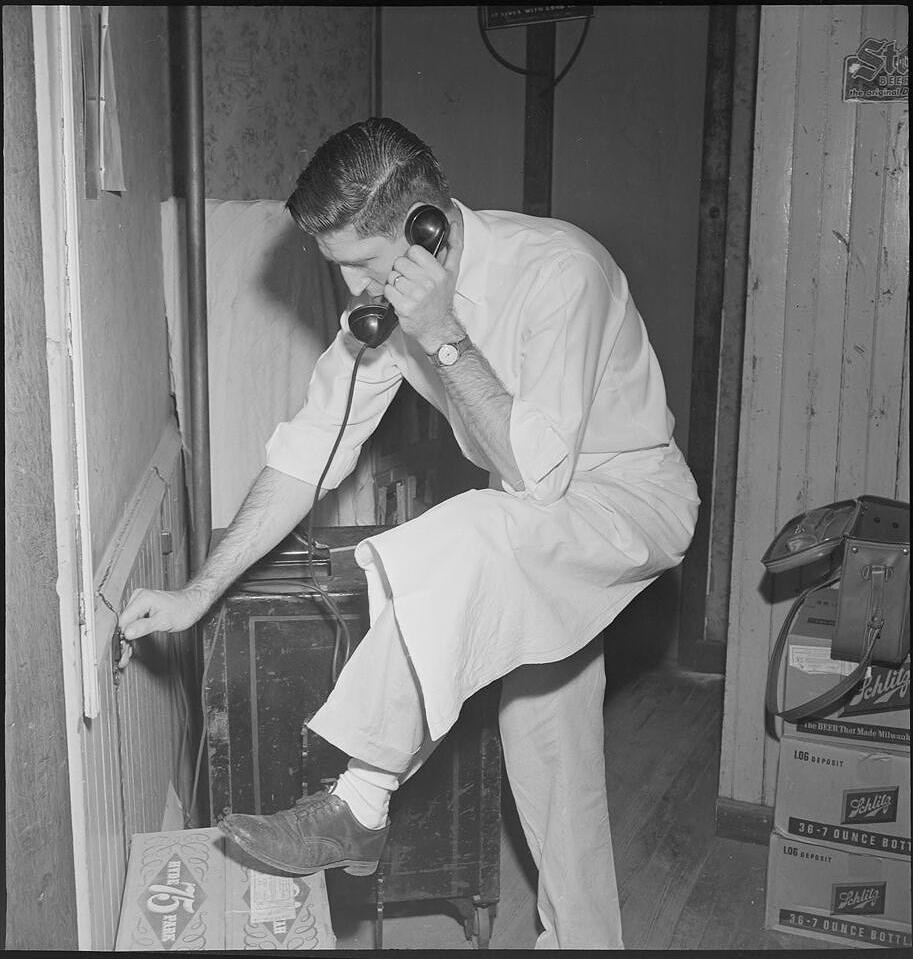
Jack Gould: Untitled (man talking on telephone, looking down) (c. 1950)
"She was my guardian angel …"
Joinings and ChanceEncounters aside, I felt intensely lonely after we were Exiled. I became a resident alien who would never feel entirely at home in my indentured homeland. I'd lost more than my home. My career had imploded with the bankruptcy. I lost my business partner, who had necessarily moved on and into another career so that we might survive. I proved less adaptable. The Republicans had left the economy in another tailspin again, and jobs were scarce, but even if jobs had not been thin, I was uncertain if I would ever prove to be employable again. The segment of society I'd successfully serviced seemed to have evaporated, and I felt every bit the old dog considering new tricks. I had not just been Exiled but obsoleted. None of my formerly familiar employments seemed available. I felt cut loose and sinking.
My writing seemed like something I might successfully fall into again.
ChanceEncounters
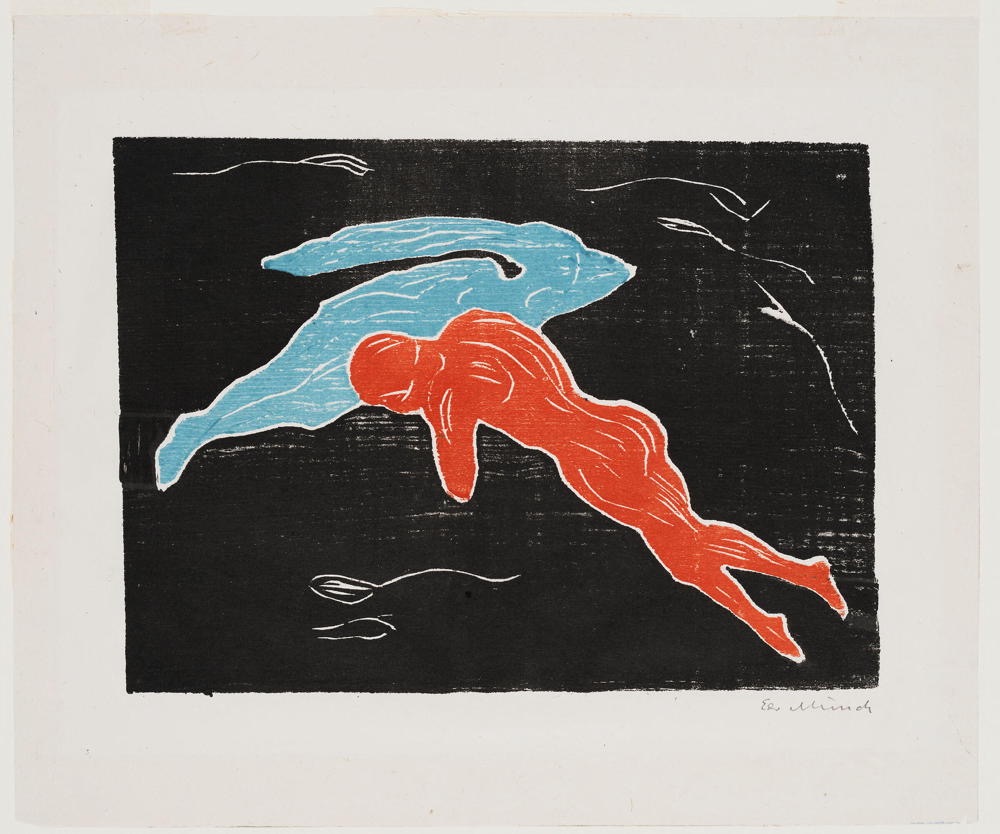
Edvard Munch: Encounter in Space
Original Language Title: Møte i verdensrommet
Original Language Title: Begegnung im Weltall
Former Title: Meeting in Space
(1898-1899)
"It’s the purpose to which we are blind that determines what we’ll leave behind."
Meeting Mitzi during that GWU lecture series was just one of the consequential ChanceEncounters I experienced while Exiled. It seemed as though one of the purposes of being Exiled was to stir up the old routine to increase the likelihood of ChanceEncounters occurring. I've long considered them just the sort of magic this world relies upon, for formal channels seem far too narrow to produce sufficiently substantial connections. However much the matchmakers might insist on the importance of formal introductions, informal ones most often suffice. Of course, they lack the sense that anything of substance might be brewing.` They're notoriously easy to miss, even if one's paying close attention. I suspect that a certain inconvenience improves these outcomes. They happen through a fog of annoyance. They happen to us. How fortunate for us and the world when we notice.
The Muse was never fully satisfied that I had not become a hermit while we were Exiled.
Cadencing
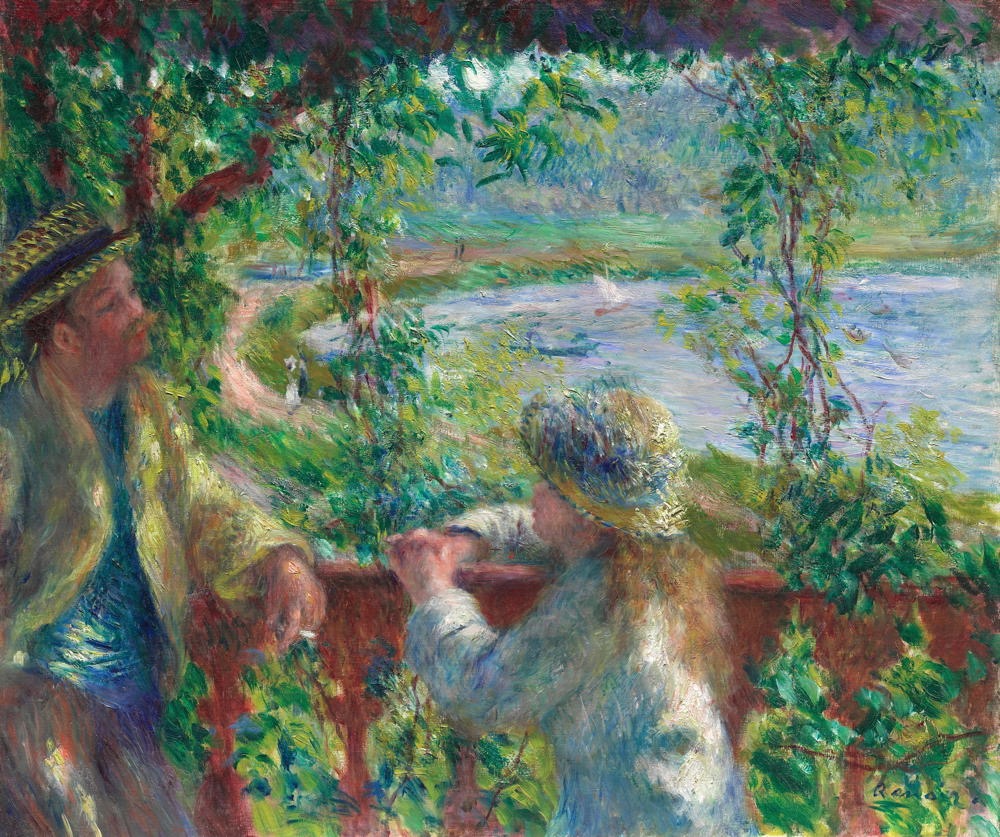
Pierre-Auguste Renoir: Near the Lake (1879/80)
"Better if it stays a mystery …"
As unlikely as it had seemed when we moved in the first of July, a rough rhythm had begun emerging from our SettlingIn by August. The GrandOtter was visiting, as she had back home in summer's past, encouraging a sense of continuity. Sure, we were still almost entirely unfamiliar with the territory we'd inhabited. Still, with remarkably few repetitions, the sense of surreal novelty began dissipating, with a false sense of familiarity replacing it. We were still strangers enough to believe we'd mastered what we couldn't comprehend, but a routine emerged. We knew where to go to find gelato, which provided ample encouragement that we were at least secure.
While we were still in our temporary housing, when we were still searching for a place to live, my publisher sponsored a book marketing seminar I attended.
Joinings
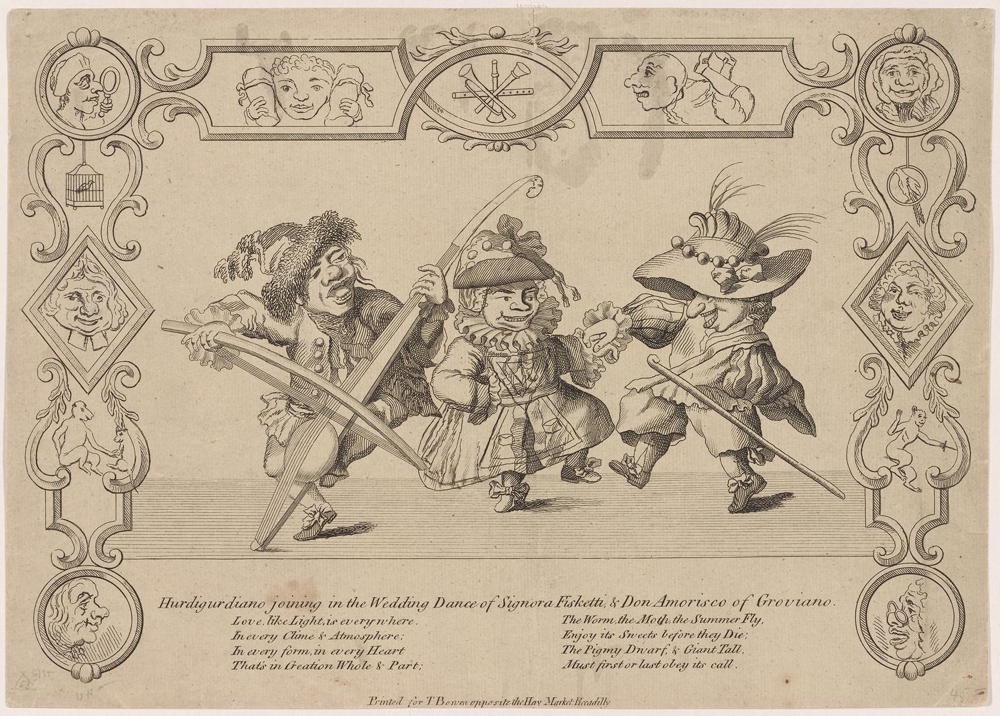
Unknown Artist: Hurdigurdiano joining in the wedding dance of Signora Fisketti (19th Century)
" … a heretical thought for this formerly heartbroken Exile."
Unknown Artist: Hurdigurdiano joining in the wedding dance of Signora Fisketti (19th Century)
" … a heretical thought for this formerly heartbroken Exile."
I was never much of a joiner. The Muse belongs to a half-dozen societies and study groups. I stay at home to get supper ready for when she returns. If I had been a joiner, I might have found a church to join after we had been exiled. Takoma Park featured several fine churches to choose from, representing all the usual denominations, but I never learned how to select a denomination, and I remain uninterested in doctrine. I "joined" the Library of Congress. The Jefferson Building's Reading Room served as an ample cathedral for me. I could choose my own doctrine there from the most extensive collection of material ever assembled. I could access much of it, too, and even have books delivered to my study shelf. I'd hop the Metro or sometimes ride my bike down to that library, where I'd sit on a hardwood chair every bit as torturous as the worst Pilgrim or Quaker pew. I almost always felt saved when I stood up to leave at the end of the day.
The Muse was dissatisfied, though, with my general get-up-and-go.
Belonging

Cornelis Visscher (II): Abraham verlaat Haran
(Abraham leaves Haran], after Jacopo Bassano (1638 - 1702)
"I could not hope to thrive without holding some deep sense of Belonging …"
Being Exiled disrupted my sense of Belonging. I fled from a place I had been steeped in all my life to a place where I didn't know myself from Adam. So much of anyone's identity seems intrinsically tied to their place, their spot, that prolonged distance from there wears one down. The open-ended prospect of never returning should be more than merely disturbing; it should and did spark a genuine existential crisis for me because I'd lost the defining element of my identity. I could and did navigate our new world as if I were present, but I wasn't. I might have been somebody else, and I could not have told anyone who that somebody else might have been. I arrived and lived initially as a placeholder of myself, hollowed out and thin.
A concerted search for myself ensued and took several forms.
Weekly Writing Summary For The Week Ending 10/24/2024
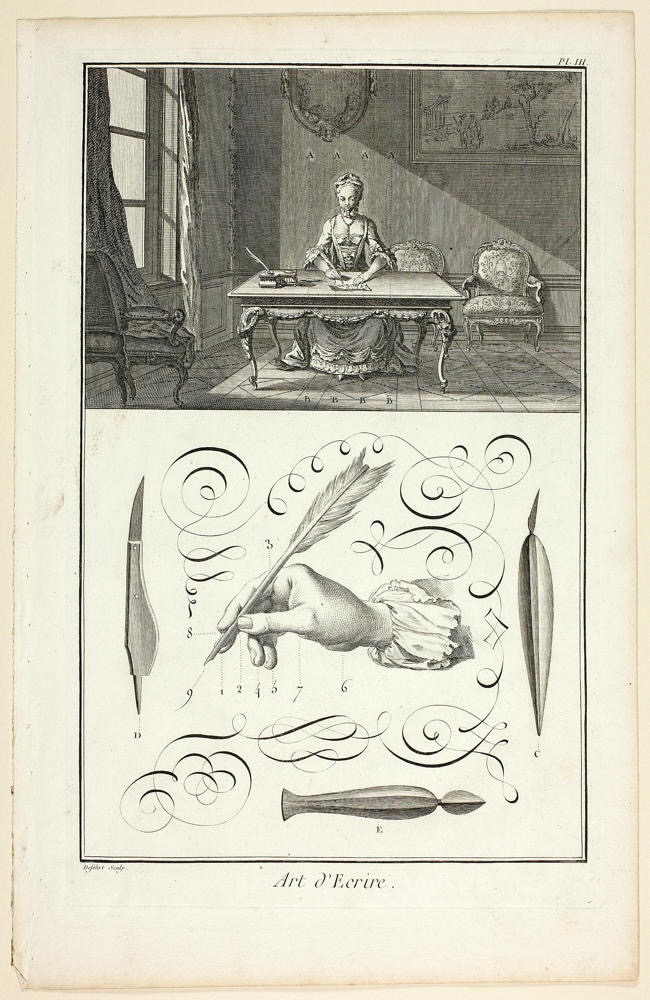
A. J. Defehrt: Art of Writing, from Encyclopédie (1760)
Memorable And Mild
Anticipating the season's first freeze has always signaled a frenetic response from me. Even when we were Exiled, I'd scurry around draining hoses and composting the contents of planters, maybe managing a final garden weeding before the pre-winter freeze settled in. I accomplish an easy dozen long-procrastinated chores that final afternoon. I even bring a few favorites inside, believing they might thrive, though they only sometimes manage to survive. The Muse complains that I bring in more white flies than begonias and geraniums. I have always been a soft-hearted gardener, hesitant to prune, so my garden becomes overgrown. I meticulously compost, though, and that last afternoon before the first freeze typically sees much material added to the composter. I'd bought some fresh composting worms and added them to my newly relined bins earlier in the week. I added the remaining rhubarb and that volunteer tomato that has seeded itself beneath the witch hazel bush with the contents of a half dozen petunia planters on top. When the frost coats the pile, the guts of that bin will be seething with enthusiasm. By Spring, I'll have a couple of cubic yards of the finest worm casings and a few hard husks and cobs of indigestible corn, marking the end of this year’s growing season. May the upcoming winter be memorable and mild!
Walking

Gesina ter Borch: Walking Skeleton (c. 1656)
"Better for me to maintain about the speed of a walking horse …"
Exile encouraged The Muse and I to engage in Walking. I believe it's true that urbanites walk more than their suburban or rural counterparts. The suburbs seem predicated upon automobile travel. One must hop in the car to go anywhere there. Even more so, our rural relatives, for everything there lies further than a short walk away. Our Takoma Park place was almost a mile from the Metro station, a comfortable twenty-minute walk. We soon considered it nothing to take that hike. Likewise, we could walk to the food co-op, the farmer's market, the local library and the video store, and even supper. Before we realized it, we had changed our lifestyle. Walking became an integral part of our Exiled days. The house was also within two blocks from about five different bus lines. It became more convenient to hop on the bus and walk than to find and pay for a place to park on the other side, so we walked. We became walkers.
In this respect, if few others, our lives in Exile were vastly improved over how they'd been before.
Credentials
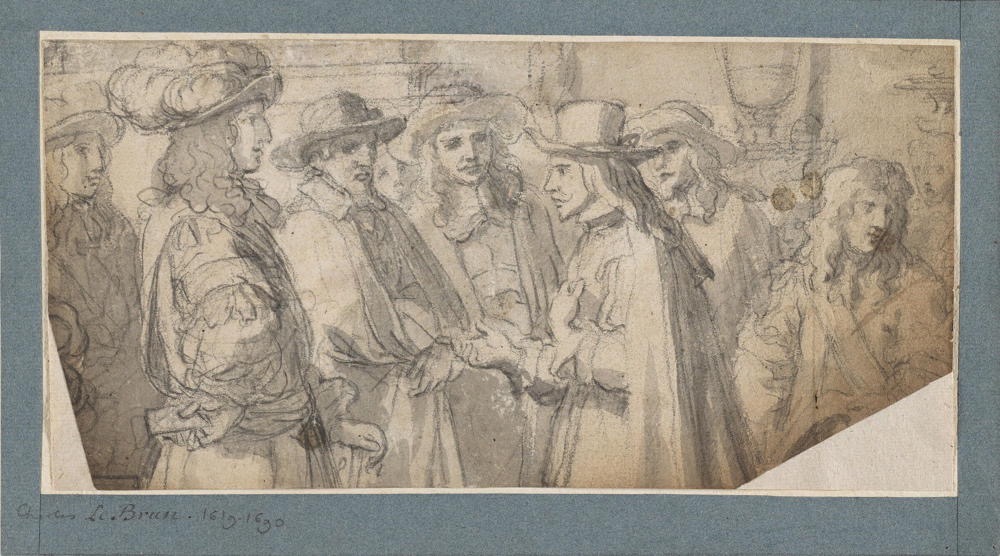
Charles Le Brun: King Louis XIV Receiving Ambassadors from the Court of Spain (c. 1674)
" … just another form of playing the same game …"
No other place in this country was ever even half as formal as Washington, DC. Everybody there seems to carry Credentials, usually on a lanyard around their neck. Those without that lanyard seem mysterious. Perhaps they're visitors? Maybe one of the rare private sector employees? Most work for our government and interact with material deemed secret from somebody. Every lobby features a security checkpoint requiring ID to pass. Office suites require a magnetic card or an escort to enter. Further, business casual has yet to arrive and might never arrive. The men wear suits and ties, and the women wear equally formal attire. Casual Fridays were never observed. People engage exclusively in serious business, much of it mandated by Congress.
The Muse received her credentials after undergoing a thorough FBI background check.
BigBox
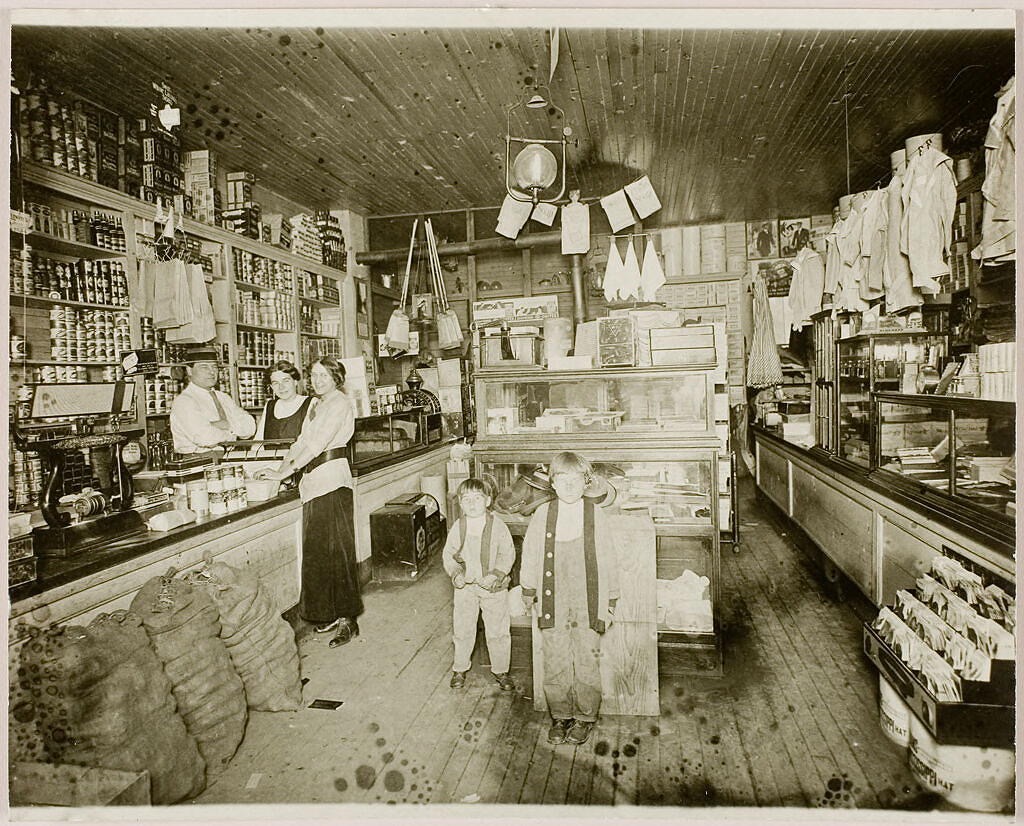
Ken Whitmire Associates:
Untitled [interior of a store] (c. 1940, restored 1970s)
"I preferred the neighborhood hardware store over the Home Despot …"
Shopping seemed less a necessity in DC than a pastime. Sundays, it seemed people flocked to shopping malls and Big Box Stores. Parking lots filled, and a seemingly sacred commerce commenced. Somebody would always be in the market for a mattress, so they were always on sale, never not! Families seemed to promenade around shopping centers as if on display themselves. Kiosks featuring the most curious businesses attracted what appeared to be primarily teenage girls. We would go when The Muse deemed necessary, for I would never even imagine going to such places unassisted. Truth told, I'd often cool my heels in the car instead of accompanying her inside, for those places always seemed so out of scale they terrified me. Further, our recent bankruptcy had left me with an aversion to buying stuff. I figured I could hold off buying things until they were really needed, and if my luck held, I'd never need to buy anything but groceries again.
Back home, we didn't have Big Box stores, so I never needed to learn how to navigate them.
EssentialErrors
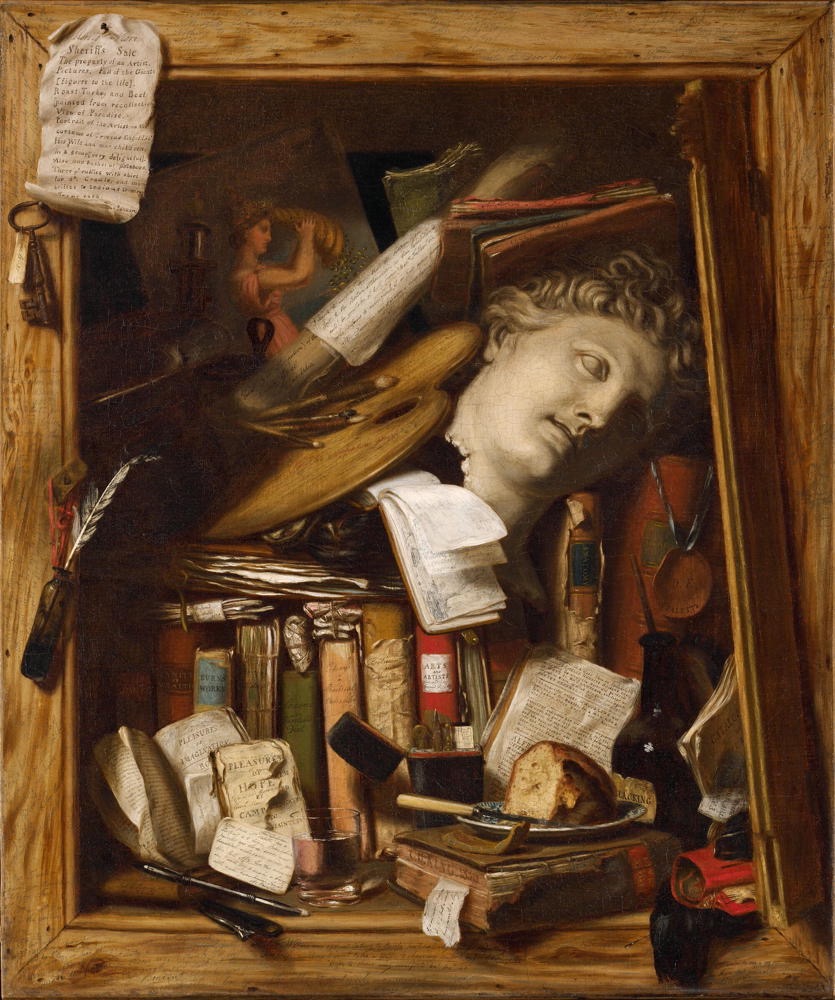
Charles Bird King:
The Vanity of the Artist's Dream (1830)
Former Title: The Anatomy of Art Appreciation
Former Title: Poor Artist's Study
Former Title: Still Life, The Vanity of An Artist's Dream
Gallery Text:
In this humorous still life, King pokes fun at popular taste and laments the plight of the arts in America. A masterful example of trompe l’oeil illusion, the painting depicts a cupboard filled with the possessions of an ambitious and well-educated but financially unsuccessful painter. Brushes, drafting tools, treatises on art, and a cast of the head of the Apollo Belvedere, the celebrated antique sculpture, are crammed in next to stacks of unpaid bills, letters from parsimonious patrons, and a “last prize” medal. Behind the loaf of bread, a fictitious news report complete with typographical errors ridicules the unsophisticated tastes of the era, and makes clear that America was a difficult place for painters like King who wanted to emulate the arts culture of Europe in the new republic: "The exhibition of a Cats Skin in Philadelphia produced TWELVE HUNDRED DOLLARS, totally eclipsing its rival the splendid portrait of [Benjamin] WEST by Sir T. LAWRENCE, the later we regret to state, did not produce enough to PAY ITS EXPENSES. OH’ ATHENS OF AMERICA. I, American (Newport, RI 1785 - 1862 Washington, DC)"
"I was usually successful when staying his hand!"
Being Exiled necessitated resolving many long-settled dilemmas. For instance, I'd encountered the necessity of finding a barber shortly after we moved into our temporary quarters. This might have once been a trivial challenge, but no longer. Now, the field seems crowded with pretenders, people who might hang their shingle without the first idea of how to barber. Some characterize themselves as "stylists," a meaningless term strongly suggesting someone who chose beauty college over learning the barbering trade. Stylists tend to call their shops "salons," as if to announce that they are different, hugging to the higher end of style and service when, in fact, they're mostly beauty parlor operators. According to some long-ago misplaced agreement, men were never supposed to break the sanctity of beauty parlors, and women were to respect the neutrality of barber shops. Greying this boundary has radicalized what was once a simple hygiene activity, turning it into a cultural statement accompanied by many seething resentments.
I'd maintained the same stylist in Portland for over a quarter century.
Stranger

Walter Crane: The strangers entertained (1910)
"Avoiding traffic became my occupation …"
I recently had a conversation with one of The Muse’s fellow Port Commissioners. He reported that he had been worrying about an impending move. He and his wife had bought a condo in town into which they would soon relocate. He explained that when he first married, he’d moved out of his parent’s place on the farm and into what had been his grandparent’s house next door. He’d lived there until ten years ago when he built his present house three miles from where he was raised. This condo would be the furthest he’d ever lived from his home place. It was ten miles away, in town. He said he’d never been away for longer than two weeks in his whole life, and he was wondering what might become of him if he couldn’t look up to see the familiar hills or predict the weather by checking what the clouds were doing. He seemed to have been scared of becoming a Stranger. I knew too well how he felt.
Once the movers left, I realized I could no longer consider myself a visitor.
MisRemembering
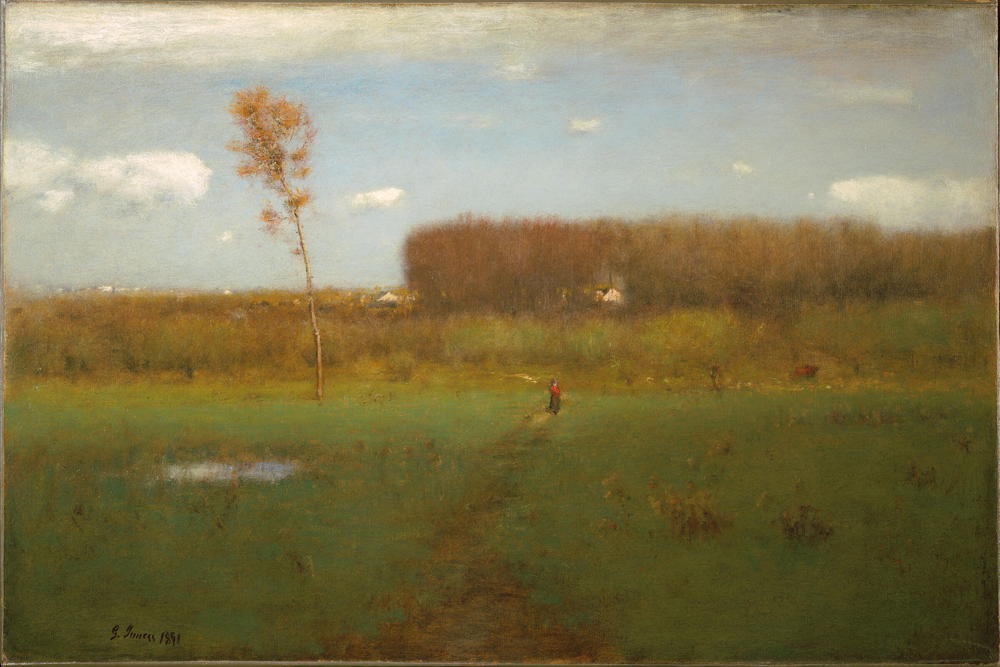
George Inness: October Noon (1891)
Gallery Text
Blurred, softly painted, and almost otherworldly, October Noon differs markedly from the realistic, crisply rendered American landscapes that hang nearby, such as Bierstadt’s magisterial view of the Rockies. Though Inness probably based this scene on the flat, marshy terrain near his New Jersey studio, his image retreats from hard facts and recognizable places to suggest a peaceful, imagined, or dimly remembered landscape. Formally evocative of work from the French Barbizon School, Inness’s quiet paintings found favor among New York patrons overwhelmed by the rumble of the new modern city. As one New York critic put it, “Now and then [Inness] has a picture of perfect peace. . . . It tranquilizes the soul even to look upon it.”
" … a heretic in Rome …"
Creating mémoire inevitably involves some MisRemembering. Dates, places, and sequences aren't always stored in recoverable order, and even short-term memory might prove unreliable. Still, it's a genuine shock whenever I discover that I've gone and done it again, presenting some fiction as representing what actually happened. The Muse usually serves up my undoing, for she has often been a witness or co-participant, and her memory might disagree with mine. Through such disassembly, the story might straighten, leaving me feeling at least temporarily crooked. But MisRemembering's no actual sin. It's more like a part of the price for engaging in remembering, with no way of escaping. The sin lies in the more deliberate DisRemembering, intentionally burnishing the facts, often to enhance the author's reputation. Every writer is probably capable of committing this sin. What matters might be how they respond to being outed.
I MisRemembered key elements of two recent stories, TheMove and SettlingIn.
Weekly Writing Summary For The Week Ending 10/17/2024
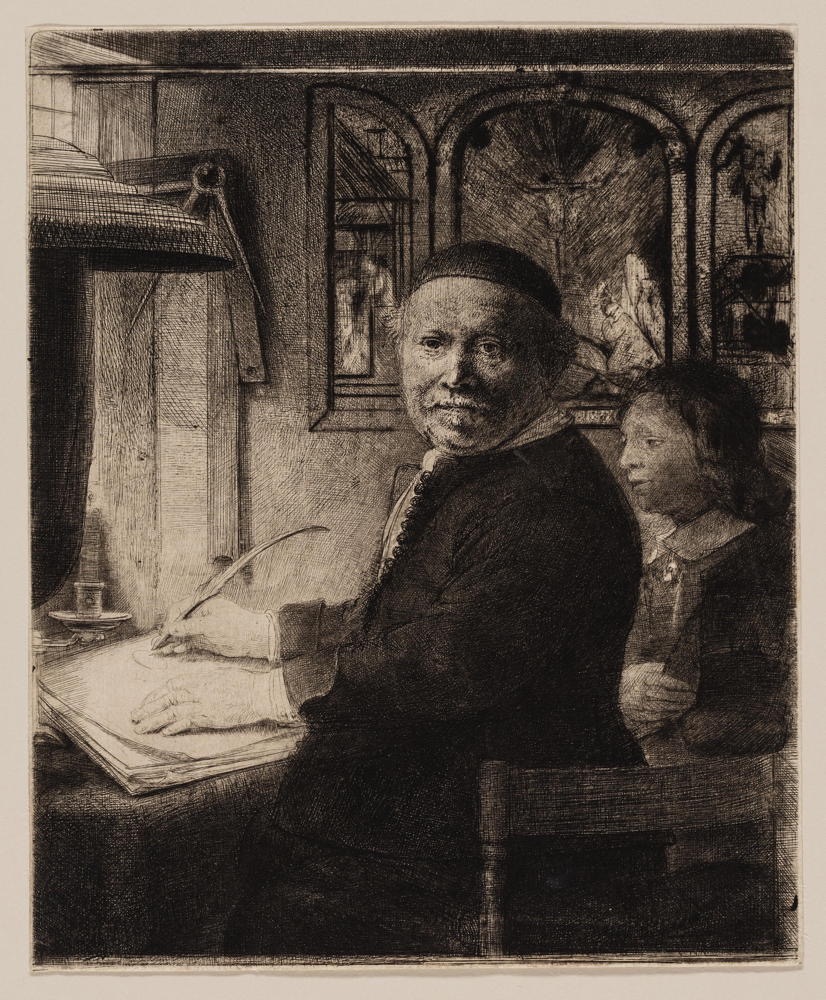
Rembrandt van Rijn: Lieven Willemsz van Coppenol,
Writing Master: The Smaller Plate (c. 1658)
Trading In Authentic Impressions
I feel grateful for my unreliable memory. The Muse corrects me at inconvenient times, often after any possibility of properly correcting the record exists. This frustrates me, but it's exasperation of my own making. I can always make amends or attempt to. Even an inadequate explanation might restore some lost credibility if only to reset my listeners’ expectations that I'm not the most reliable source. Gratefully, my stories don't have to be true to be useful. They might accurately represent my lasting impressions even if they materially misrepresent what happened. Time scales shift. Whatever happens becomes different if seen through any rearview mirror. I'm never entirely sure I'm present at any moment, anyway. I'm reasonably confident that I was effectively absent through the first few Exiled months and I still find reason, now that I've returned, to question just how present I ever become. I distract myself partly by reflecting and attempting to remember things. I cannot simultaneously be there and here, though I don't go anywhere different when I'm in reverie, writing. I shift my attention, which doesn't demand that I watch whatever's playing before my eyes. I remain grateful that I'm so easily distracted I possess the genuine superpower to doze off, particularly when in the middle of some traumatic experience, so I never accurately record what happens. I trade in authentic impressions that might or might not necessarily strongly correlate with what actually happened.
Settling_In
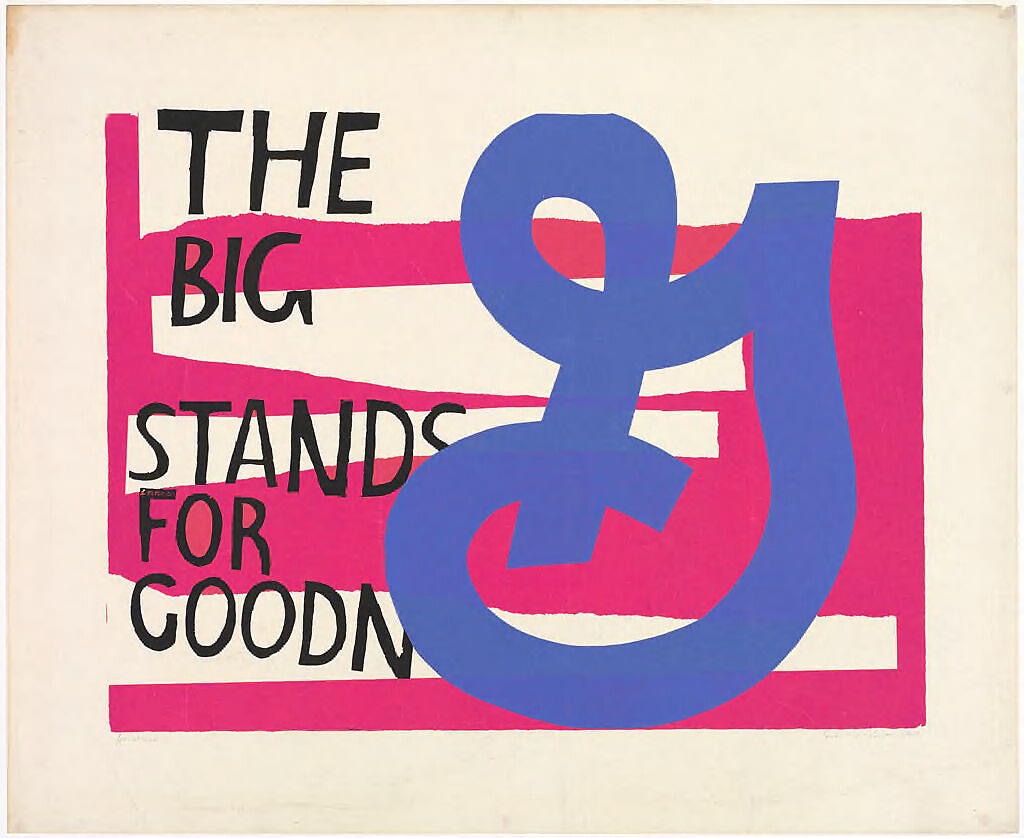
Corita Kent (Sister Mary Corita): for eleanor (1964)
Inscriptions and Marks Signed: l.r.: Sister Mary Corita IHM
(not assigned): Printed text reads: THE BIG G STANDS FOR GOODN[ESS] / 4 Eleanor
" … we could read their deep disappointment at what their future had wrought."
When I was little, on Christmas morning, my siblings and I would sometimes rewrap already-opened presents so we could open them again. July 2, 2009, brought that feeling back into focus for me. After more than three dog months living without our stuff—that having been boxed up, carted off, and stored somewhere until we found a place to live—opening those boxes felt like a ginned-up Christmas. The Muse was overjoyed to be reconnected to her extensive dish collection. That house was the only one we considered that came even close to having enough kitchen cupboard space to contain it. We parked our china cabinet along the one blank kitchen wall to hold the display items.
My office space, a narrow windowed room off the dining room, seemed perfectly dimensioned for my purpose.
TheMove
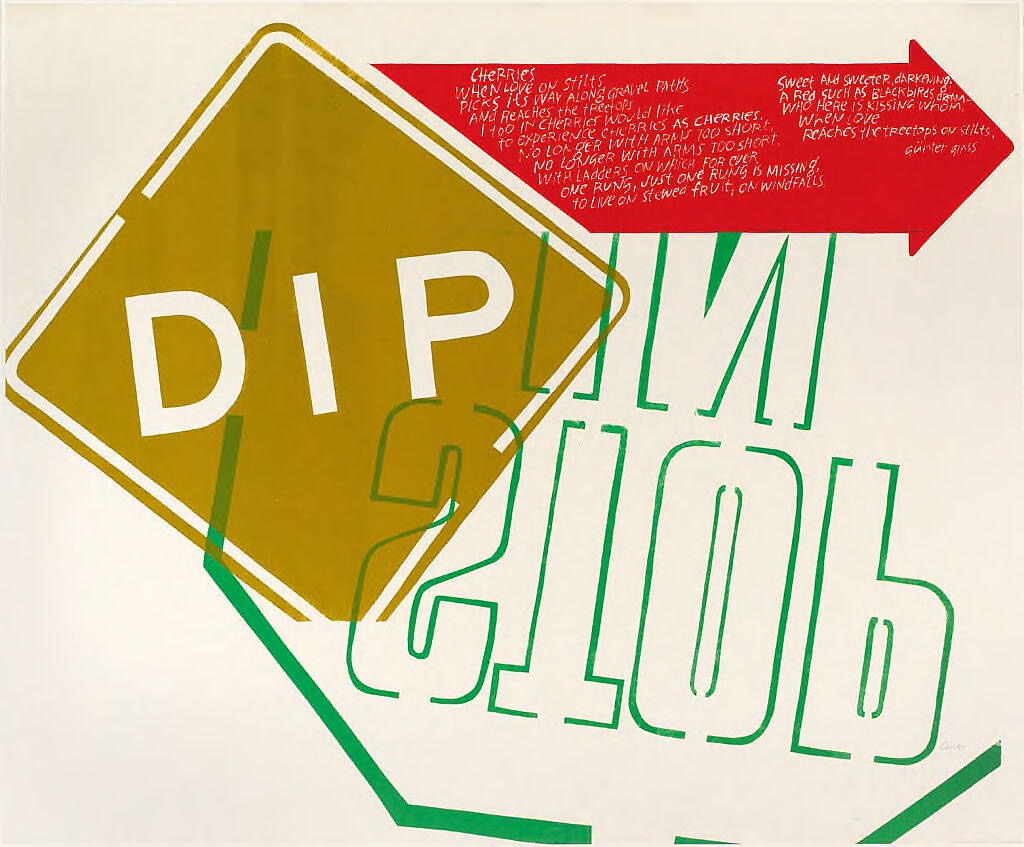
Corita Kent (Sister Mary Corita): dip (1967)
Inscriptions and Marks: Signed: l.r.: Corita
(not assigned): Printed text reads: DIP / IN STOP / Cherries when love on stilts picks its way along gravel paths and reaches the treetops I too in cherries would like to experience cherries as cherries. No longer with arms too short, no longer with arms too short, with ladders on which for ever one rung, just one rung is missing, to live on stewed fruit, on windfalls. Sweet and sweeter, darkening; A red such a blackbirds dream-who here is kissing whom, when love reaches treetops on stilts. Günter Grass
"We would be months getting accustomed to Tacky Park …"
July 1, 2009, would be warm and sticky, hanging in the high seventies into the low eighties. In the unaccustomed humidity, it certainly seemed much warmer to The Muse and I with The GrandOtter beside us, as we packed up our few belongings and the cats and left the temporary housing high-rise for the last time. We were unaccustomed to the drive to the other side of The District, for Rosslyn was just over the Southern border and Takoma Park, hard on the Northeastern edge, eleven miles and nearly an hour's drive. We were to meet up with the movers at the Sherman Street house. This was the day we would finally move in; TheMove was at hand. We'd left home three full months before and overstayed our temporary housing welcome by a month, but we were finally going to land somewhere.
As it does in summer back there, the world smelled musty and damp. I'd already sweated through my clothes by the time we arrived.
Finders
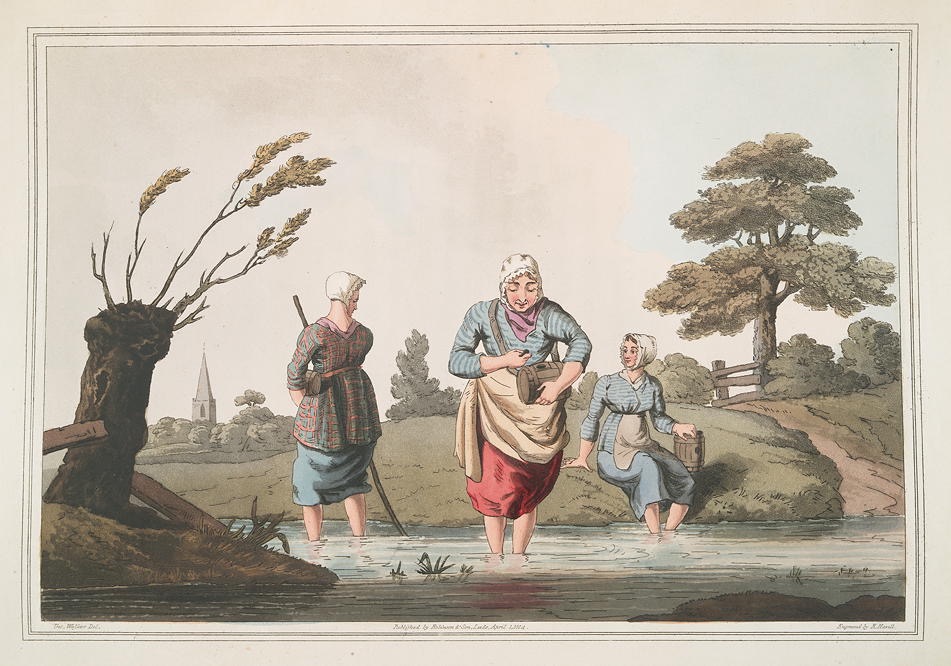
George Walker: Leech finders, Plate 35 (1814)
Engraver: R. & D. Havell
"We mostly avoided going that way."
The transition from seekers to Finders felt abrupt. After weeks of fruitless seeking, we became Finders one early Sunday morning in May. We had almost overstayed our welcome in our temporary housing, for our search had apparently been unusually fruitless. The Muse pleaded for an extension, which was granted, but we were already more than ready to regain access to our stuff and move out of that high-rise. We had taken to cruising our chosen destination on weekends. The Muse with her Blackberry at the ready, refreshing CraigsList postings, so we were around the corner when our new home's listing first appeared. We were there in seconds. The owners had recruited the neighbor to show the place. They'd relocated to The Hague for the wife's job. The neighbor and I turned out to be brothers from different mothers. We instantly hit it off, and he became our champion. We learned later that he called the owners when we left to tell them that the right tenant had just left. He implored them to say "Yes," that they wouldn't ever be sorry for a second. They weren't.
A financial and credential check was still required.
North

Corita Kent (Sister Mary Corita): right (1967)
Inscriptions and Marks — Signed: l.r.: Corita
(not assigned): Printed text reads: [W]RON[G] WAY / Prophets of boom / and if only we arrange our life according to that principle which counsels us that we must always hold to the difficult, then that which now seems to us the most alien will become what we most trust and find most faithful. How should we be able to forget those ancient myths that are at the beginning of all peoples, the myths about dragons that at the last moment turn into princesses; perhaps all the dragons of our lives are princesses who are only waiting to see us once beautiful and brave. Perhaps everything terrible is in its deepest being something that wants help from us. Rilke
" … With our attention finally properly focused …"
To move to Washington, DC, is to confront racism face to face. In many places, the racism seems securely hidden to the point that you'd swear it doesn't exist there, except, perhaps, in that one isolated quarter where African-Americans traditionally settled. In Portland, Oregon, where I spent twenty-nine years of my adult life, the "black" neighborhoods had been developed using an overt discrimination called "redlining." Banks would only loan mortgage money to African Americans in certain areas. When I-5 was created, it was built right through the middle of that designated area, further fragmenting and isolating the neighborhoods there. This practice was hardly unique to Portland, though. Seattle was no better and might well have been worse. The Bay Area in California designated Oakland as their minority area and the East Bay. East Palo Alto was, for years, the South Bay's designated ghetto.
When shopping for neighborhoods, our realtor advised me to avoid certain areas.
Circling
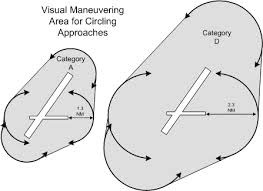
Corita Kent (Sister Mary Corita): tomorrow the stars (1966)
Inscriptions and Marks — Signed: l.r.: Sister Mary Corita (not assigned): Printed text reads: come alive / Tomorrow, the stars
"The East was looking iffy after Cheverly."
I employed a Circling process when searching for a place for us to live. Circling makes it particularly difficult to assess progress because the ending point of a Circling route is always back at the starting point. It often seems as though absolutely no progress has been made, affecting motivation. The only clues that I had been doing anything all day were the fresh marks on the master map denoting identified unsuitable areas. The Circling eventually managed to winnow down what seemed like infinite choices into a more blesséd few. I figured that any day I could disqualify an area had been well spent. I might not have produced any likely candidates, but if I had managed to eliminate territory, I wouldn't have to worry about further canvassing that area.
The elimination began before we started searching when we decided Northern Virginia would be unsuitable for our habitation.
AlmostRandomly
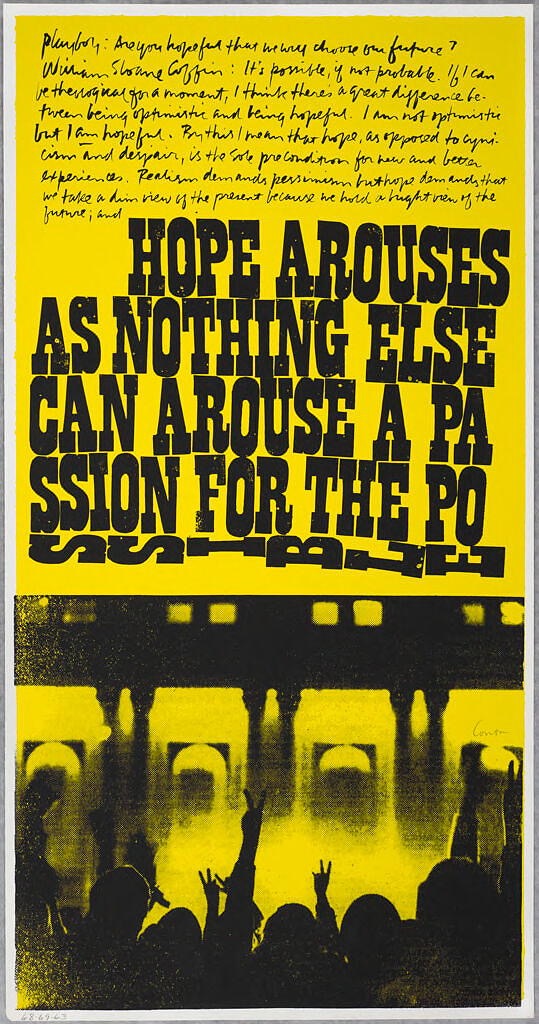
Corita Kent (Sister Mary Corita):
a passion for the possible (1969)
Inscriptions and Marks — Signed: l.r., within image: Corita
inscription: l.l., in graphite: 68-69-63
(not assigned): Printed text reads: Playboy: Are you hopeful that we will choose our future? William Sloane Coffin: It's possible, if not probable. If I can be theological for a moment, I think there's a great difference between being optimistic and being hopeful. I am not optimistic but I am hopeful. By this I mean that hope, as opposed to cynicism and despair, is the sole precondition for new and better experiences. Realism demands pessimism but hope demands that we take a dim view of the present because we hold a bright view of the future; and HOPE AROUSES AS NOTHING ELSE CAN AROUSE A PASSION FOR THE POSSIBLE.
"We continued searching AlmostRandomly …"
Our highest priority upon arriving in Exile became finding suitable digs. The Muse's employer had thoughtfully provided temporary housing through an Oakwood franchise, the sort of housing guaranteed to encourage short tenancy. I'd lived in an Oakwood property when working for a boutique Silicon Valley consulting firm fifteen years earlier. That was a sprawling two-story suburban affair ringing a swimming pool. This latest one was a fifteen-story highrise overlooking a firehouse. The swimming pool was situated out back behind security fencing and a thick hedge. Both were places that reeked of dislocation. I inhabited my Silicon Valley one four nights each week, baffling myself at the supermarket when failing to remember which refrigerator I was stocking. I'd invariably end up with too much and too little of some things because I could never keep my inventories straight. Our Arlington neighborhood of Rosslyn apartment wouldn't offer any such entertainment.
The apartment proved to be a definite downgrade from our usual and customary.
Weekly Writing Summary For The Week Ending 10/10/2024
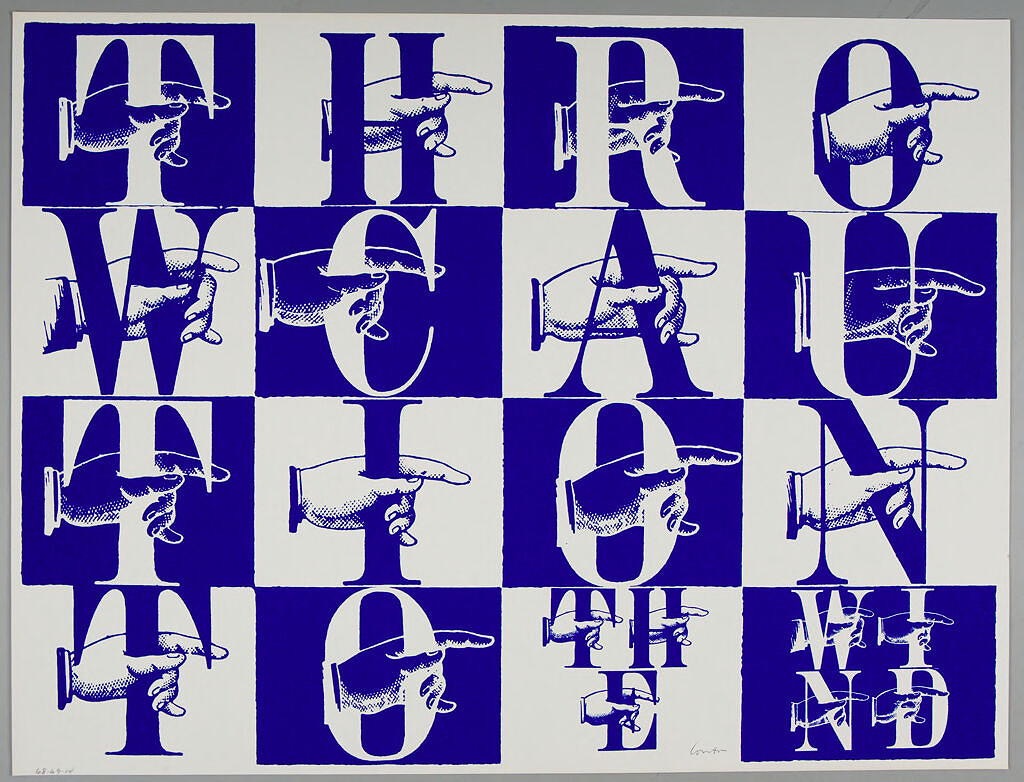
Corita Kent (Sister Mary Corita): n is for caution (1968)
Inscriptions and Marks
Signed: l.r.: Corita
(not assigned): Printed text reads: Throw caution to the wind
inscription: l.l.: 68-69-14
—
My Context Trying To Clue Me In
During an optometrist appointment this week, I was delighted to notice that I could easily read the bottom line on the chart with or without my glasses. My eyesight improved and stabilized after cataract surgeries four or five years ago. Those surgeries marked the end of my middle ages, for it was when prepping for the surgery that my high blood pressure was first acknowledged. I pled that I suffered from White Coat Syndrome, where the presence of a medical professional elevated my blood pressure to alarming levels, but neither The Muse nor the doctors bought my story. The Muse insisted, as only The Muse can insist, that I finally find a personal doctor. I'd successfully avoided having one through my remarkably healthy fifties and well into my sixties, but I complied and began regularly visiting pharmacies shortly after that. My blood pressure returned to normal, and my eyesight improved, so I felt satisfied when my eyes seemed to see so well during that latest examination. Then came the part where I was told to cover one eye and read the chart. My right eye worked fine, but the chart became a complete blur when I covered it to read from my left unassisted. I couldn't even read the largest letters. I spent the better part of a half-hour fussing about my performance before I checked my glasses. The left lens had some severe scratching, obscuring the view. I needed new lenses, not new eyes. How often have I mistaken some shortcoming as defining me when it was just my context trying to clue me in?
Variety
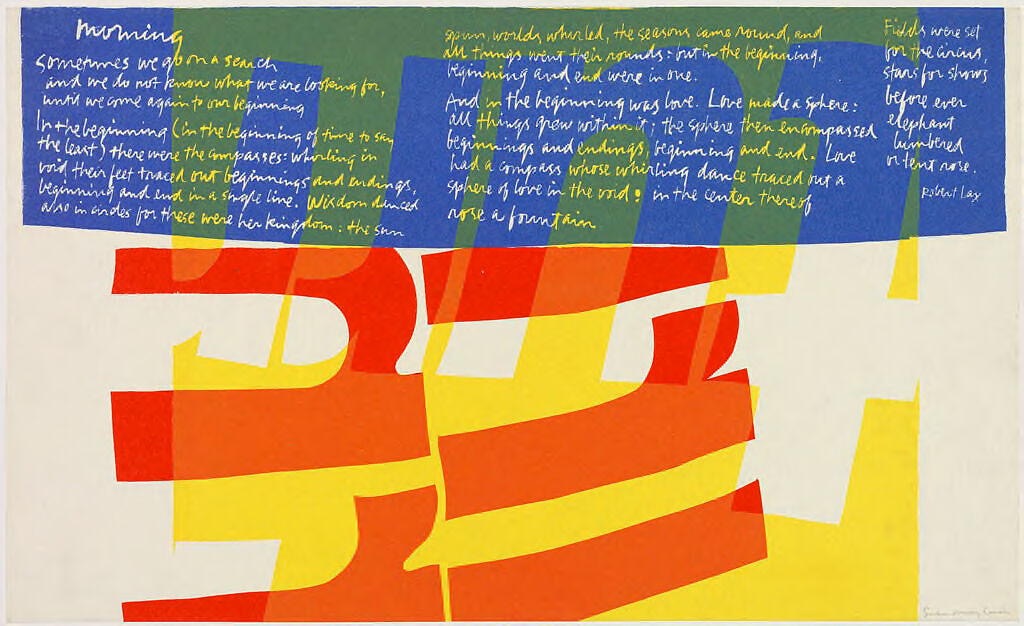
Corita Kent (Sister Mary Corita): morning (1966)
Inscriptions and Marks
Signed: l.r.: Sister Mary Corita
(not assigned): Printed text reads: [tu]r[n] [tu]rn / turn / Morning Sometimes we go on a search and we do not know what we are looking for, until we come again to our beginning In the beginning (in the beginning of time to say the least) there were the compasses: whirling in void their feet traced out beginnings and endings, beginning and end in a single line. Wisdom danced also in circles for these were her kingdom: the sun spun, worlds whirled, the seasons came round, and all things went their rounds: but in the beginning, beginning and end were in one. And in the beginning was love. Love made a sphere: all things grew within it; the sphere then encompassed beginnings and endings, beginning and end. Love had a compass whose whirling dance traced out a sphere of love in the void: in the center thereof rose a fountain. Fields were set for the circus, stars for shows before ever elephant lumbered or tent rose. Robert Lax
—
"I feel nostalgia for those times without wishing to return to them for a minute."
Washington, DC, surprised me. Like most cities, it seemed as if it would be something different than it turned out to be. Like New York City, which is merely a close association of remarkably small neighborhoods, DC is also tiny at its root. It carries much history on its shoulders, but it's not a very complicated place. It is, or always was, a "Chocolate City," one of the few with a genuine African-American majority. It also features one of the more entrenched aristocracies in this country, featuring diplomats and higher-ups to match or better any other place. It has more blue-collar workers than most places but also more white-collar ones. It features more professional administrators than anywhere. Those elected to high office might maintain their offices there, but an invisible cadre of office workers and security personnel manages their affairs. It's the best-guarded city, and nothing happens there without many pairs of eyes witnessing, confirming, and cataloging. It features more Variety than any other ten cities anywhere.
I noticed the Variety of goods sold in supermarkets first.
Shoestrings
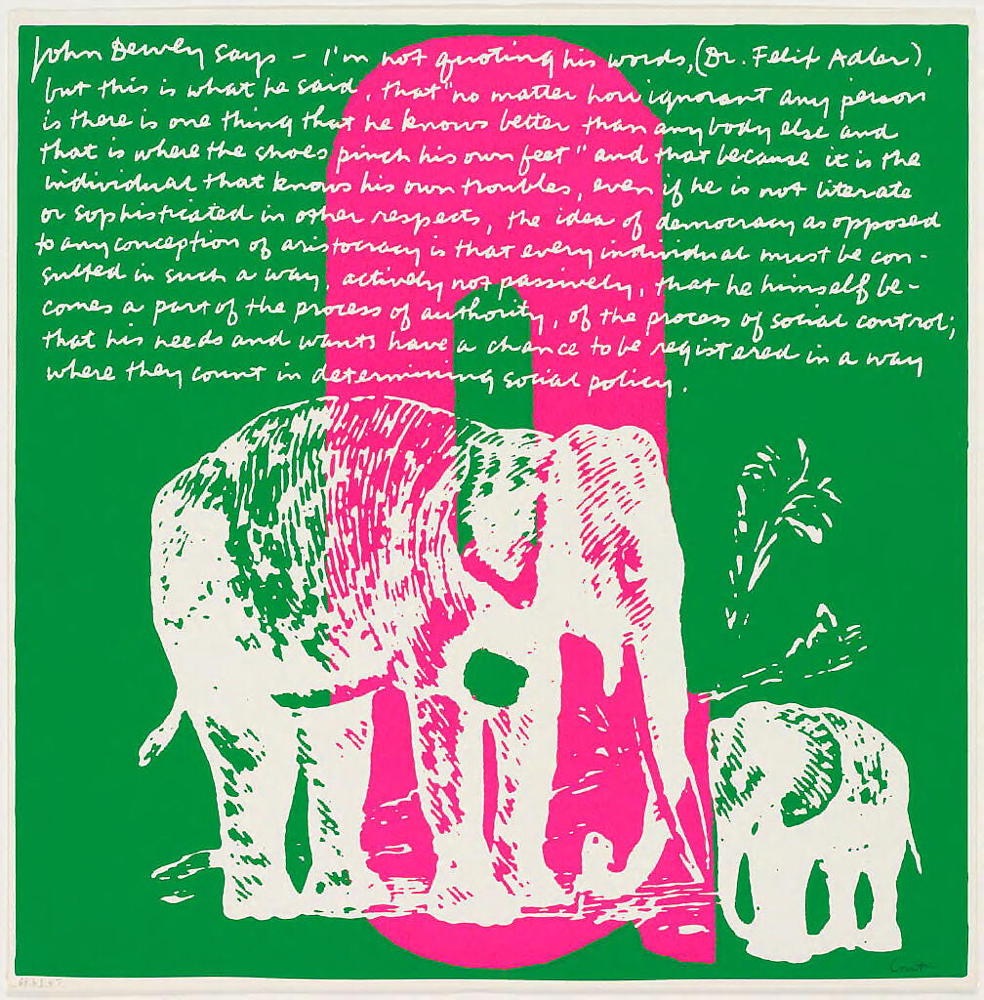
Corita Kent (Sister Mary Corita): elephant's q (1968)
Inscriptions and Marks
Signed: l.r.: Corita
(not assigned): Printed text reads: Q / John Dewey says-I'm not quoting his words, (Dr. Felix Adler), but this is what he said, that "no matter how ignorant any person is there is one thing that he knows better than anybody else and that is where the shoes pinch his own feet " and that because it is the individual that knows his own troubles, even if he is not literate or sophisticated in other respects, the idea of democracy as opposed to any conception of aristocracy is that every individual must be consulted in such a way, actively not passively, that he himself becomes part of the process of authority, of the process of social control; that his needs and wants have a chance to be registered in a way where they count in determining social policy.
inscription: l.l.: 68-69-47
" … undifferentiated others certainly originally came from one."
My parents' birth families seemed to the childhood me to be filled with contradictions. There appeared to be a profusion of odd relations: second and third cousins, step- and half-siblings, what my mom referred to as "Shoestring" relatives. Some were actually related by blood or marriage, while others were adopted, the sort of people one might choose, which, of course, one can never do with any blood relative. Most lived far away. We might have seen them once in all my growing-up years, through town for a reunion or funeral, and never to return. Most had legends associated with them. My mom could recite the stories as if she'd written them, though I suppose her mother taught them before she realized she was teaching her anything. Our Shoestrings complete already complicated enough family portraits.
When The Muse and I were Exiled, we could have sworn that we didn't personally know anybody in the entire region into which we were cast.
Escape

Edward Ruscha: Crackers [How to Derive the Maximum Enjoyment from Crackers] (1969)
"My incarceration was also an Escape …"
Being Exiled felt like an assault, an insult to my dignity and reputation. It was also a great gift that I couldn't, for the life of me, perceive at first, for every life is a mix of liberation and sentence. As liberation, it overflows with freedoms. As a sentence, it severely restricts movement. One must always be here rather than there, no matter how one might wish to be there instead. Perhaps a week away on what passes for vacation must serve as the only possibility for distraction. Most of the time, one must contend with the intended and unintended consequences of being themselves. No place seems all that glamorous that sees the same face waking up every morning. Variety might be the spice of life, but most lives are explicitly constructed to inhibit too much variety. They generally promote even more of even more of the same.
So, being Exiled served as an Escape from those patterns.
AShamed
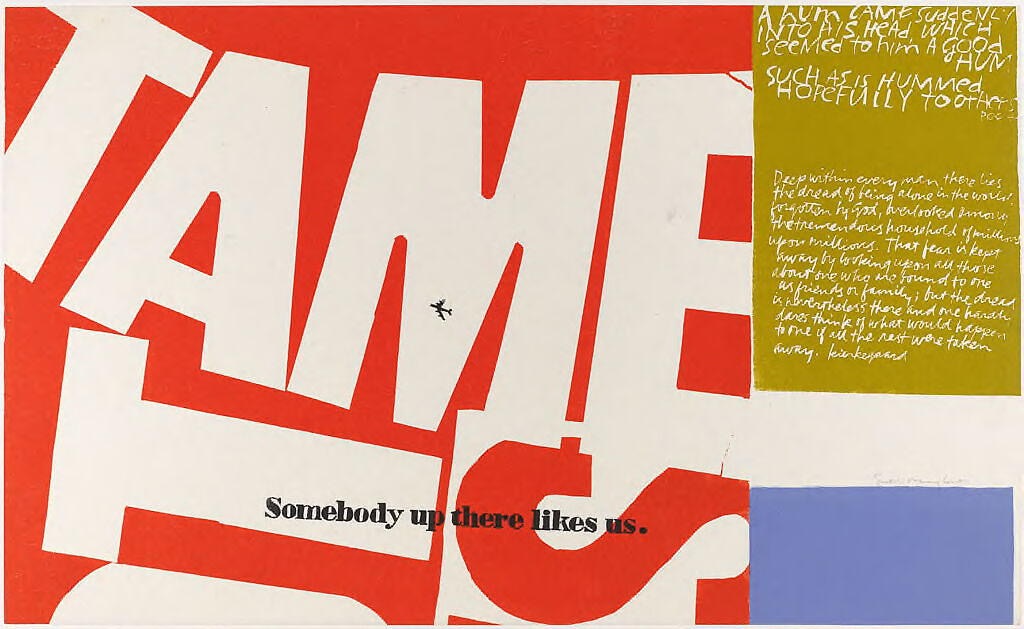
Corita Kent (Sister Mary Corita):
(tame) hummed hopefully to others (1966)
Inscriptions and Marks- Signed: l.r.: Sister Mary Corita
Printed text reads: TAME [IT']S [NO]T / Somebody up there likes us. / A hum came suddenly into his head, which seemed to him a good hum such as is hummed hopefully to others. Pooh / Deep within every man there lies the dread of being alone in the world, forgotten by God, overlooked among the tremendous household of millions upon millions. That fear is kept away by looking upon all those about one who are bound to one as friends or family; but the dread is nevertheless there and one hardly dares think of what would happen to one if all the rest were taken away. Kierkegaard
" … one helluva way to make a name for myself."
I was Exiled in considerable shame. Not shame bestowed by anybody else, with the possible exception of a certain misguided skip-chaser who called several times each day from different numbers to harass me about my recent bankruptcy, and most certainly not the citizens of my hometown, who treated The Muse and I with only the utmost decency and respect once our dilemma became public. No, I'm afraid I shamed myself. This was perhaps a misguided act of sincere contrition, for it sure seemed that someone should take the blame for everything leading up to our being expelled from our Eden. In my own misguided fashion, I blamed myself and set about extracting satisfaction in the form of the most profound damage anyone can ever do to themself.
Shaming is no simple form of blaming.
AnAloneliness
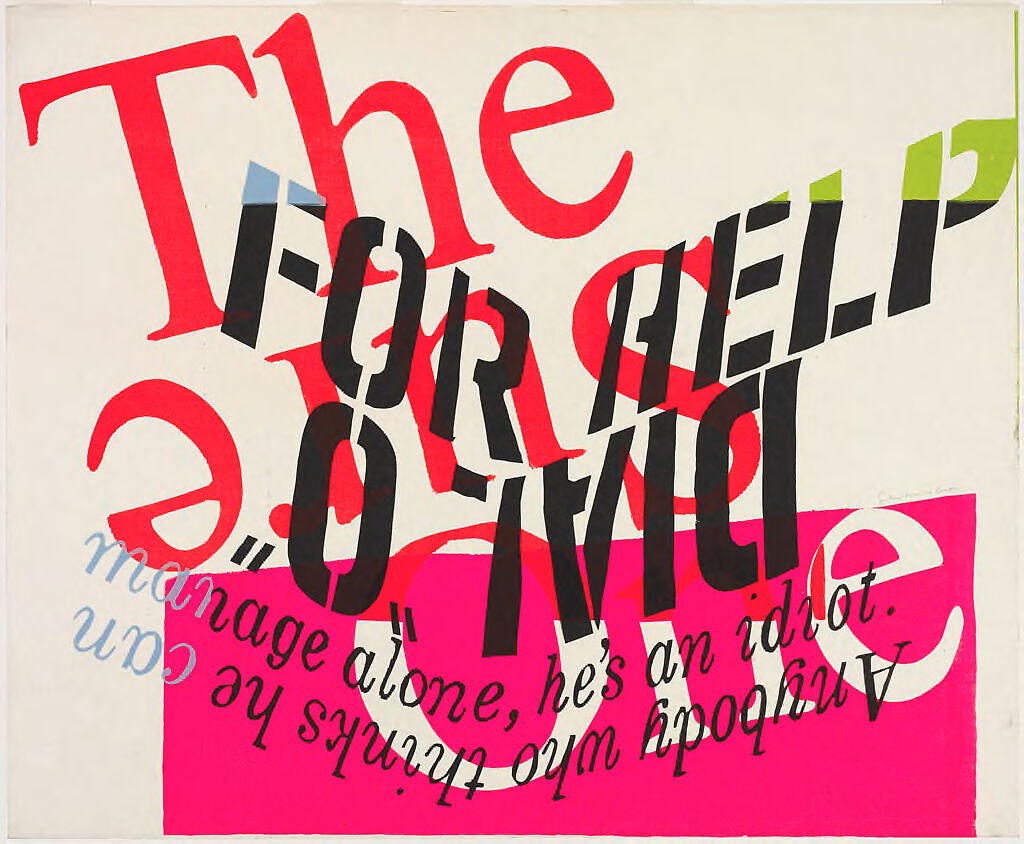
Corita Kent (Sister Mary Corita): the sure one (1966)
Printed text reads: Dial "0" FOR HELP
/ The Sure One
/ Anybody who thinks he can manage alone,
he's an idiot
" … damned to return to a world poorer for his absence after inhabiting a world seemingly poorer for his presence."
The Exile didn't begin until about ten days after The Muse and I left our home behind. We spent most of that first week driving across the country to our temporary apartment in the Rosslyn neighborhood of Arlington, Virginia, every inch of twenty-six hundred miles from what had been our home. On the way, we stayed over one night outside of Kansas City with dear old friends, though we were hardly even shadows of ourselves by then. We'd seen Sandhill Cranes gathering like angelic buzzards along the Platte River reaches near Grand Forks, Nebraska. Our cats were grateful for a night over in something other than a motel room. I guess we were sociable enough. The next night found us in Lexington, Kentucky, and the following in Rosslyn. It took three trips to empty the car of all our possessions, up and down in the elevator from the underground parking garage.
Other old friends happened to be passing through town that weekend.
Grooves
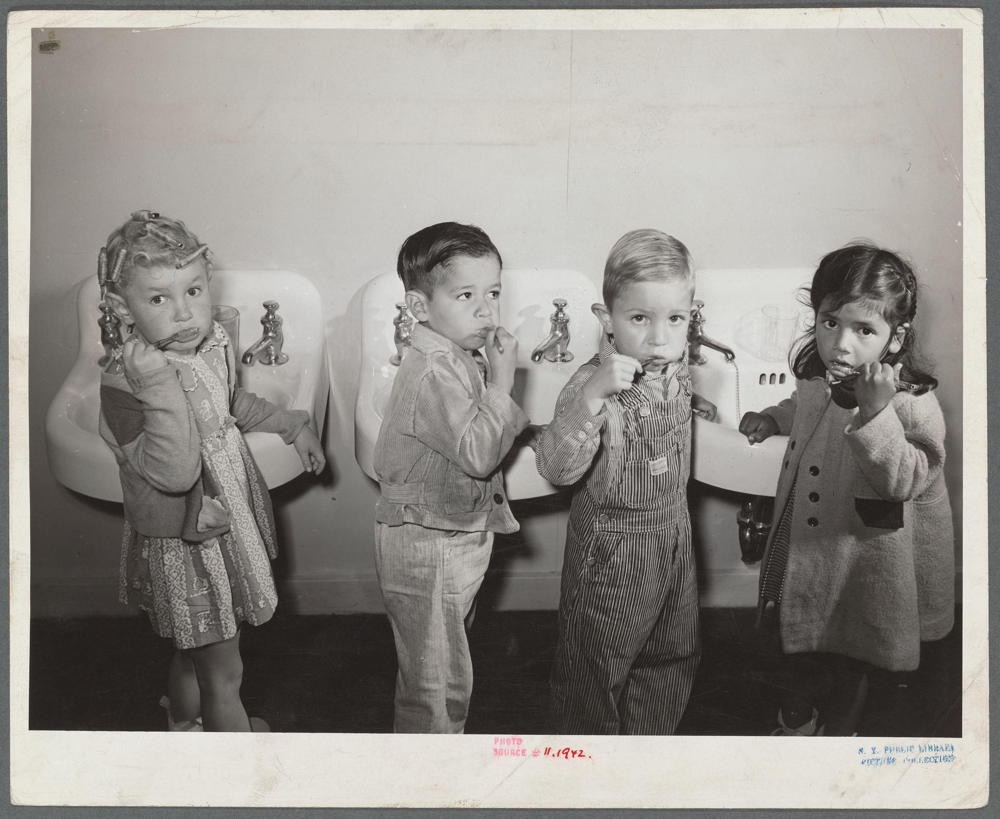
Arthur Rothstein: Morning routine, nursery school,
Harlingen, Texas. FSA camp. (1942)
United States. Farm Security Administration
"Losing our Grooves leaves us wandering relatively aimlessly in wilderness."
Being Exiled separates one from their Grooves, their essential routines that pretty much define them. Grooves might seem non-essential, but after losing every other point of orientation, a Groove or two prove at least reassuring, perhaps even confirming. They are who you are and were inseparable before they weren't. Loss of home might feel like loss of self, but losing those Grooves seals the separation. Through early Exiled days, I moved around in a definite haze. I couldn't find my rhythms, the cadences within which I engaged. I suffered from a form of arrhythmia where nothing seemed to work right. I could continue doing anything I'd done before, but without an essential elegance, as if I'd been thrown back into rank amateur status. Even activities in which I'd grown skilled became difficult. I was more likely to slice my thumb when in the kitchen. I'd even nick my chin when shaving.
Grooves grow to become invisible.
Weekly Writing Summary For The Week Ending 10/03/2024
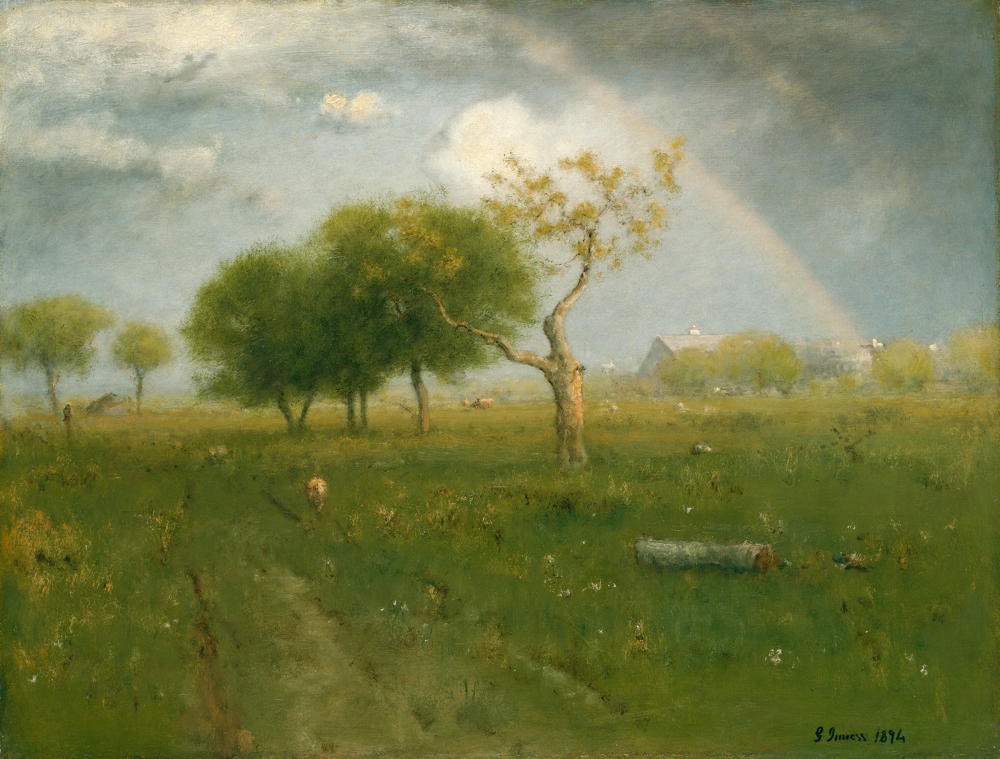
George Inness: After a Summer Shower (1894)
It Cost Us Much More
I woke this morning to find Molly, our nearly feral girl cat, curled up on top of The Muse's open suitcase. We'd returned home the afternoon before to find our boy cat Max waiting and ready to mount my lap for some overdue petting. Molly had slipped in unnoticed later for her quick bite of supper before disappearing back out into her waning summer. The Muse harvested the week's worth of ripe tomatoes from our extraordinarily productive garden, and we took supper inside, the outside temperature having plummeted into Autumn in the short time we'd been gone. Our absence had made our hearts grow fonder for this place from which we were so long ago Exiled. Homecomings since have been uniformly sweet. They make the leaving seem worthwhile even though the world we find out there seems increasingly hostile to innocent visitors. Decent digs seem almost impossible to find. We traveled well again, our style honed in no small measure by our long-ago exile. We travel almost exclusively via roads few consider taking. We avoid schedules, often stopping to read and learn from those roadside readerboards. I gratefully slow to allow whoever's behind me to pass, lest they follow too closely and learn our sacred secrets. We learned to find our way by being rudely Exiled and thriving anyway. May we never have to go away like that again. I'm grateful, though, for the learning being laid low afforded us. I'd say our understanding's priceless, but it cost us much more than that. It's worth more, too.
SecretPassages
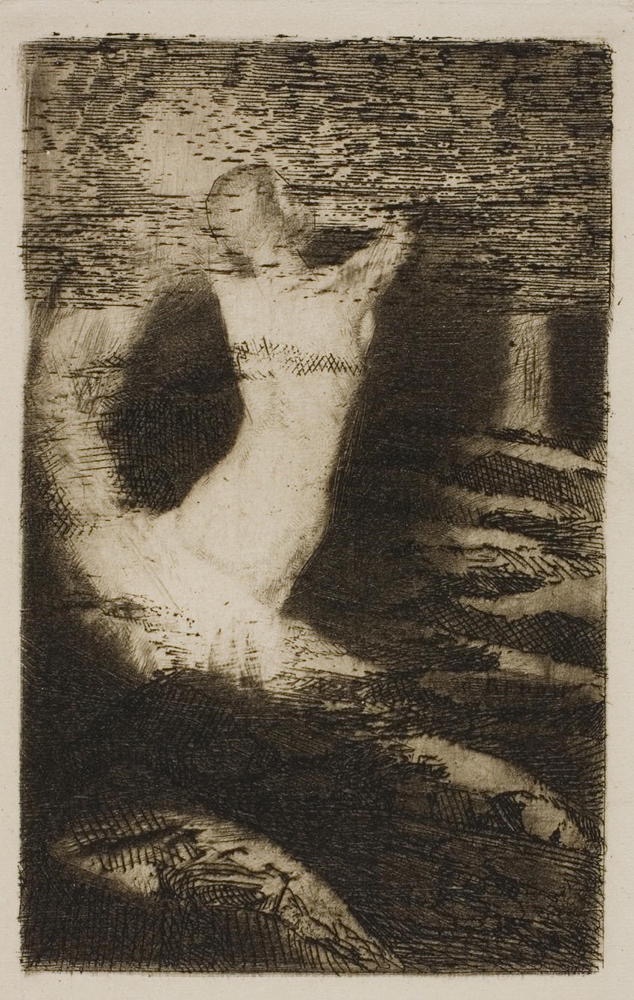
Odilon Redon: Passage of a Soul (1891)
"The roads least taken tend to be the ones most worth taking."
The Exiled do not readily adopt their new home. They naturally resist assimilation because too easy an integration might serve to disrespect their "real" home. They will find many reasons why their new station seems inferior, however superior it might objectively seem to every other observer. Traffic became chief among my complaints when we landed in Northern Virginia. Traffic had evolved into absolutely unworkable patterns there, where the bulk clogged what were euphemistically referred to as arteries. These often proved to be among the longest paths between any two points, but paradoxically also the most traveled. I believed that this had more to do with habit than design. People often follow what appear to be the wider paths, for instance, when narrower ones might make more sense. Of course, if everyone followed these shorter paths, they'd become clogged, too, so I worked hard to keep my emerging SecretPassages secret.
Chief among my strategies for keeping my SecretPassages secret involved turning off any navigation apps that might be recording my passage.
Anonymity
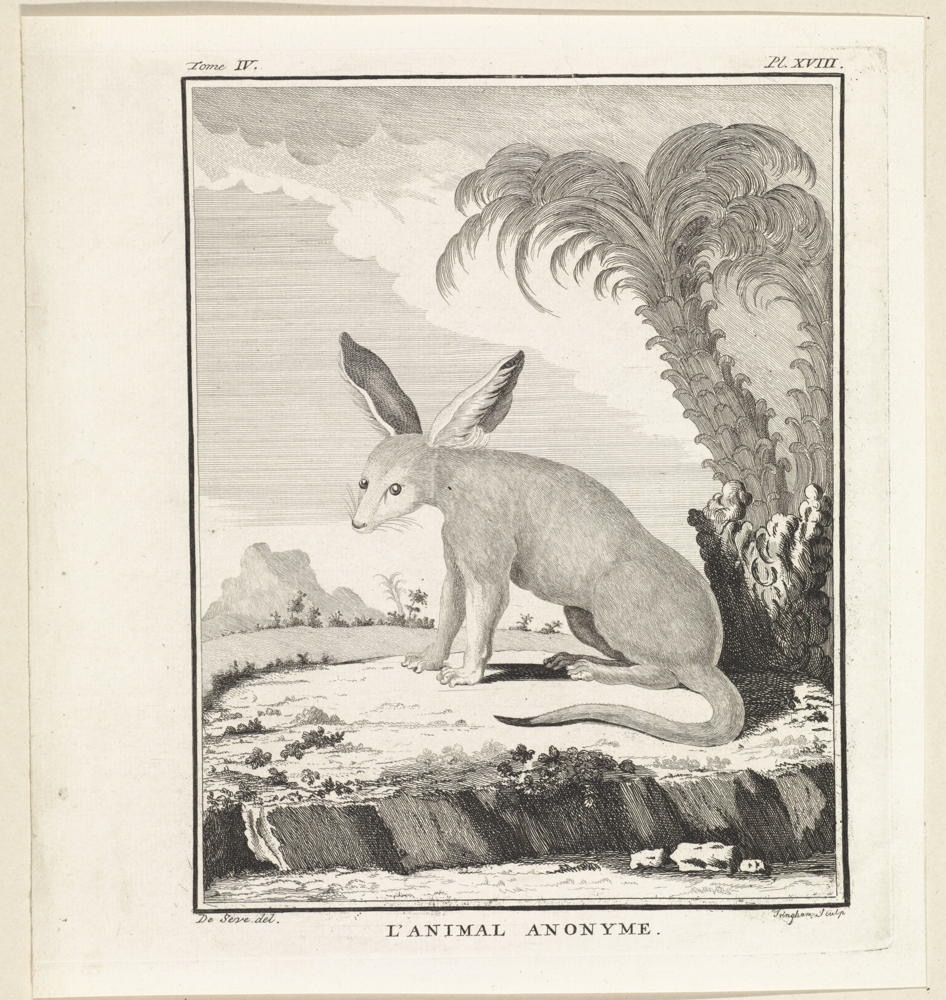
W. Tringham, after Jacques de Sève:
Onbekend dier [Anonymous Animal] (1773)
" … I sense myself a better man …"
Anonymity might be the one utterly reliable superpower that the newly Exiled possess. Though stripped of most of their possessions, they all acquire this one in exchange. It might initially seem freeing to move about the world with nobody watching or anyone watching having no clue what they're seeing, but this gift has indefinite limits. The anonymous hold little influence. They have nobody they can call to help them out should they get themselves into a jam. They can go anywhere without fear of being recognized, but they tend to roam few places where such recognition might matter. It's as if they exist without any observers, without any risk or hope of accidentally bumping into someone influential and embarrassing themselves. The Anonymity, while initially freeing, comes to wear one down. If nobody knows you from Adam or Eve, it might become difficult to know what you believe. Acquaintances can at least remind you who you are or who you used to be, and without that feedback, it grows difficult to remember who you are or were in this world.
Anonymity reliably produces ghosts.
ExPat
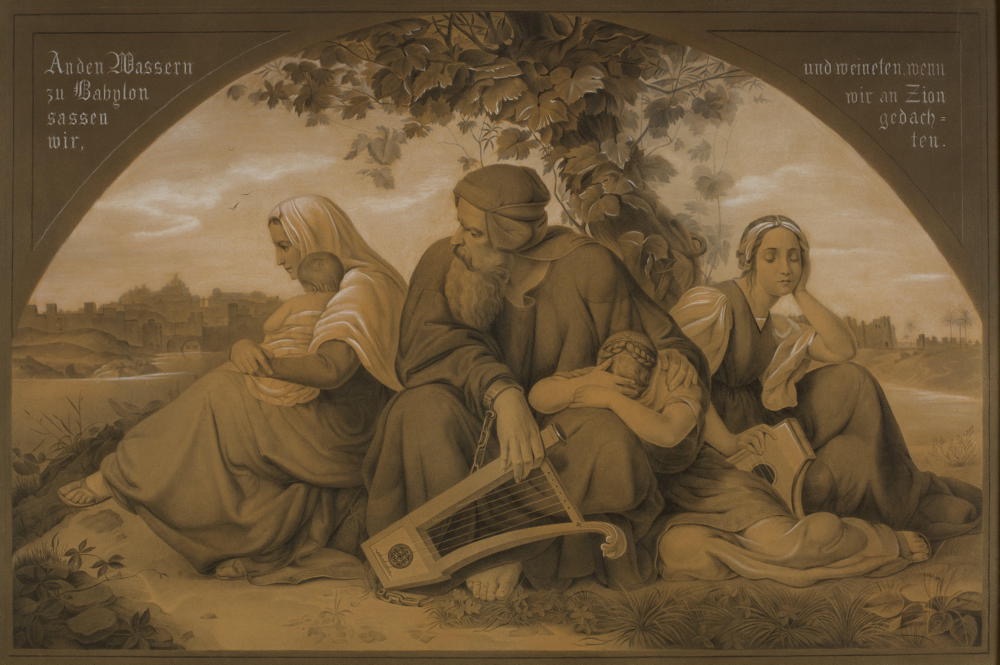
Eduard-Julius-Friedrich Bendemann:
The People of Jerusalem in Exile (c. 1832)
" … not actually sentenced to spend time in jail but still there, even if Just Visiting."
Before we'd found permanent housing, we discovered that we'd been Exiled into the one place with more Exiles than any other place in this country. Federal government employees are routinely sent "on station," assigned to work in Washington for periods ranging from a few months to a few years. Thousands are encouraged to volunteer for these assignments, promised better future promotions, and a deeper understanding of how the system they're a part of works. Many bring their families, but more don't, and consequently, there are thousands of people left wondering what to do on weekends. Many work right through their weekends, figuring that the sooner they finish their assignment, the sooner their exile might end. Local connections seem challenging to make. The locals have families to attend to, and other ExPats have their own lives to live. Further, the sheer size of the DC Metro area means that people who work next to each other throughout the week might bunk fifty or more miles apart. Consequently, an Expat's life can be lonely.
The Muse and I, within a couple of weeks of arriving, began hosting a Sunday night potluck supper at our temporary digs.


